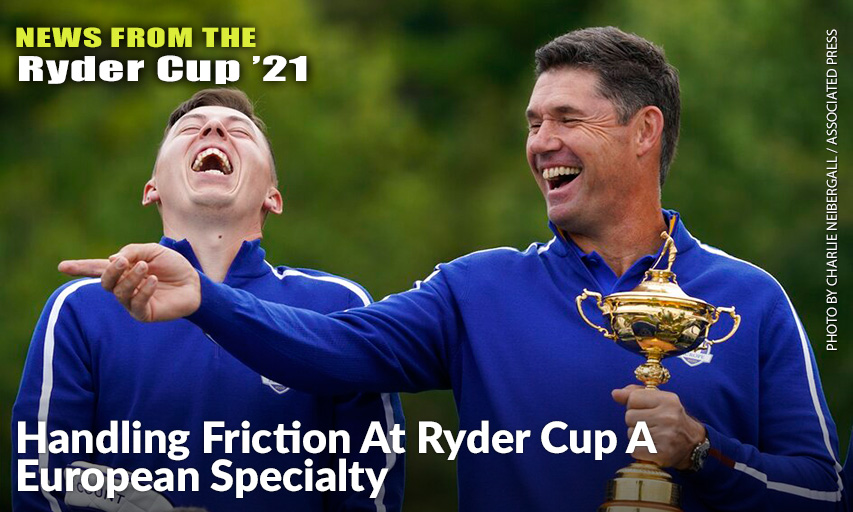Handling Friction At Ryder Cup A European Specialty
- Details
- Category: Inside Golf
- Published: 2021-09-22

By DOUG FERGUSON, Associated Press
SHEBOYGAN, Wisconsin — Friction within the team is nothing new at the Ryder Cup.
Except for the Americans.
Europe has been dealing with it for decades, whether it was the enmity between Padraig Harrington and Sergio Garcia, the grievances Darren Clarke and Thomas Bjorn had with Colin Montgomerie or the general dislike between Ian Woosnam and Nick Faldo.
It hasn’t kept the Europeans from winning with regularity. Woosnam and Faldo were even partners in 1987 at Muirfield Village and didn’t lose any of their four matches.
But this is different.
“I think it was kept pretty quiet. No one else was really involved,” Rory McIlroy said of past European squabbles. “The grievances on the other side have been pretty public.”
A large part of that is due to social media, the space where Bryson DeChambeau and Brooks Koepka have waged a silly battle for the better part of two years.
It reached an uncomfortable level in June when DeChambeau asked security at the Memorial to intervene when he was tired of hearing fans calling him, “Brooksie,” and Koepka responded with an Instagram post offering free beer if any spectator had his or her day cut short by being ejected.
They are teammates at Whistling Straits, though most likely not partners. And it sounds as though it won’t be a problem.
“You realize it’s only a week, right?” Koepka said this summer. “I can deal with anybody in the world for a week.”
U.S. captain Steve Stricker says he has spoken to them and has been assured by both players that it won’t be an issue during the Ryder Cup. The six automatic qualifiers for the American team met for dinner in Atlanta two weeks ago and there were no reports of anything but normalcy.
The ultimate measure will be played out over three days of 28 matches that start Friday. But it starts away from the course, in the privacy of the team room.
“I sat down and had dinner with him last night, and it was fine,” DeChambeau said without saying if it was a table for two. He also suggested “something fun” in the future with Koepka, perhaps more evidence they are ready to move on.
It can be perceived as a potential distraction. Harrington, now the European captain, believes it also can be a source of strength.
“When you have friction between players, you bring them into a team environment and you overcome it, that’s actually a big bonus to the team. If they get their act together and pull together, the team sees that and pulls together really strongly. All of a sudden you get an uplift from it,” Harrington told The Guardian.
“You could say myself and Sergio had that little bit of friction over the years, which we easily overcame. We would be hugging at the Ryder Cup.”
Harrington speaks from experience.
He and Garcia were at odds even before Harrington rallied to beat him at Carnoustie in the British Open in 2007. One telling moment was at The Players Championship in 2013 when Garcia accused Tiger Woods of causing fan movement, a rift that dominated the week.
Harrington was asked about Woods’ behavior on the golf course and raved about him, giving Woods an “A-plus” for etiquette and an “A-plus” for his respect toward other players. He then was asked what grade he would give Garcia.
“I’m not in a position to rank players,” Harrington said as British journalists broke into laughter.
Paul McGinley wanted Harrington as one of his assistant captains the following year at Gleneagles. McGinley told British media last week that he went to Garcia to see if that would work before asking Harrington to join him.
When they arrived at Gleneagles, the captain found Harrington and Garcia playing table tennis.
“When we go to the Ryder Cup, we don’t even feel them. They don’t even come across,” Garcia said of the various personality conflicts.
“You have your favorites — guys you get along with, some you get along with a little worse,” he said. “I can’t speak for the Americans. I don’t know what happens there. But it feels like when we get in the team room, everyone takes their armor off and puts it aside. You can feel that. Everyone is happy to put their arms around everyone else and try to help.
“It’s just the way it is.”
That’s how it was described with Montgomerie, who ran afoul of one too many European teammates by vastly improving his lie in the Indonesian Open in 2005. Get him in the team room at the Ryder Cup, where he was made to feel special so he could play his best golf, and Montgomerie delivered. He never lost a singles match in eight Ryder Cup appearances.
McIlroy and Graeme McDowell were in an awkward position in 2014 at Gleneagles. McIlroy was suing the management company that also represented Graeme McDowell — the two major champions from Northern Ireland had been partners the two previous Ryder Cups.
Phil Mickelson couldn’t resist a dig when asked how well the Americans play in team matches. “Not only are we able to play together, we also don’t litigate against each other, and that’s a real plus,” Mickelson said.
That was different, as McIlroy notes, because it involved lawyers more than players.
Besides, it wasn’t a problem. Europe won handily. That might be what it takes for anyone to believe the Americans get along as well as they say they do.



